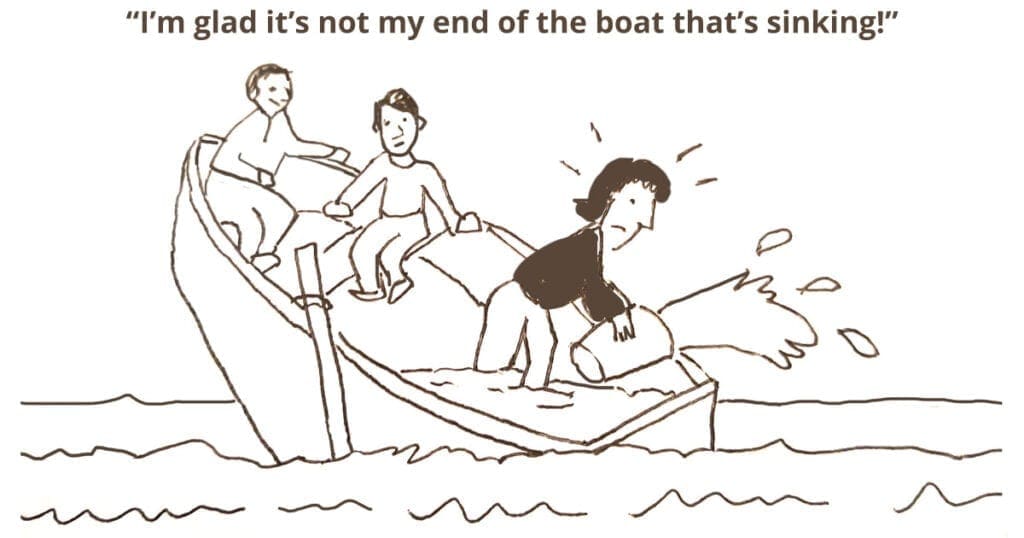Laudato Si – A Call To Change Our Way of Thinking
In this fifth anniversary year thoughts on the message of Laudato Si
One image
It is a simple graphic! But as we have heard since our youth, “pictures are worth a thousand words.” The graphic illustrates two common, but disastrous, attitudes.
The first attitude is a myopic view of problems. I can’t see anything beyond what affects me.
The second is like unto the first. I can’t see problems that do not appear to affect me now.
Both of these are manifestations of a tendency as old as civilization. “Me-ism”!
The cartoon perfectly captures these two manifestations of the same problem. Being “high and dry” is not a sustainable solution.
Isn’t this one of the problems today in coping with the pandemic of the coronavirus. Just because I don’t feel sick doesn’t mean that I am not a carrier of the virus. Out of concern for those I love (every other child of God, not just those significant in my life) I need to develop the habit of wearing a mask when appropriate as well as more frequent hand washing.
If we are truly God’s sons and daughters whether we look different, live in different zip codes, or vote differently, the first commitment for each of us must be to work toward a shift from being “me-focused” to “we-focused.”
It is in our best interest to step back and see how we are focusing on only ourselves being “high and dry.” We need to address the underlying causes of what our brothers and sisters face as they are trying to bail out their end of the boat. We’re all in this boat together!
Laudato Si summed up in five words
“We live in Gods house”
I recently revisited the scene in the Gospels, where Jesus casts out the money changers saying that his Father’s house is a house of prayer. I asked myself whether my concept of “my Father’s house” too small?
Our earth and all that is in it is God’s own house, permeated by the Spirit of God from the dawn of creation, where the Son of God pitched his tent in the supreme event of the Incarnation.“
We live in God’s house as God’s children. But as children, we haven’t matured yet.
Let me share a reaction of myself as an immature child at Christmas. It may not be surprising but as a young boy, the gift that I definitely did not appreciate was clothing. I wanted toys!
There were other gifts that I got that I appreciated because they were what I wanted. But I often missed the more important gift… the love that was being shown through the gift. In short, sometimes I neither appreciated the gift nor the love that the gift symbolized.
Pope Francis connects the dots
Pope Francis connects dots of insights expressed in just one graphic or five words. In a way that few beside Pope Francis can do, he invites us to a big picture or a systemic way of thinking.
He moves us beyond what I recently referred to as “whack-a-mole” approach to problem solving to “big picture thinking.
Some are amazed and others intimidated that it took him 15,000 words to connect so many dots. On the other hand, I am amazed at how comprehensive a view he offers of our inter-relatedness and the inter-relationship of the wide range of issues in a mere 15,000 words.
For further thought…
- How aware am I of that we are all God’s children in this boat together?
- How aware am I that I live in God’s house?








Thanks, John, for this reflection and for the chance to comment.
First, I am happy to read Pope Francis’ June 20, 2020 speech to the physicians, nurses and healthcare worker of Lombardy, in which he unmasks the illusion that individualism, “Me-ism,” is.
Secondly, I agree with a comment in Vincentian Mindwalk that “humility and trust are much better pathways than power.” But I’d like to point to an out-of-this-world “kindly power” that the first reading for the 16th Sunday in OT (Wis 12, 13. 16-19) speaks about.
Thirdly, I submit that we may have to make do with fostering, in today’s pluralistic civil societies, only “the greatest amount of good or happiness for the greatest number,” and support, say, ACA until a much better legislation (not to be mistaken for morality) is enacted. Even the Lone Ranger’s strict code of conduct include these, among other things: (1) “That sooner or later… somewhere … somehow … we must settle with the world and make payment for what we have taken.” And (2), “That men should live by the rule of what is best for the greatest number.”
Fourthly, that “the devil is in the details,” seems to me to demand that each one should engage in the kind of discernment that St. Vincent asked Antoine Durand to do. For there are situations that general principles apparently cannot deal with precisely. That’s why there is casuistry. And why, too, that sometimes moral conclusions don’t seem to follow logically from general moral principles or premises.
And so, there’s need to let the Spirit, the dynamic element in the Church, to guide us to all truth, as unbearable and illogical that it may seem and, because of which, then, we need the Spirit’s “consolation without cause” of St. Ignatius Loyola’s Spiritual Exercises.